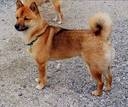Japanese Shiba Inu
Lifestyle Needs

The Japanese Shiba Inu is a medium sized, Spitz-type hunting dog. He is typically watchful and alert but should not be aggressive if appropriately socialised. He needs to live in a house with a garden and should have plenty or exercise. Coming from a working background the Shiba needs an owner who will provide him with training challenges and stimulating activities. His dense weatherproof coat means that he will enjoy being outdoors in all weathers. He should be groomed very regularly. Care should be taken to keep him cool in warm weather.
Genetic Diversity
(Known as Coefficient of Inbreeding: 'COI'. It should be as low as possible.)
The UK Kennel Club breed average COI is 6.9% - See 'A Beginners Guide to COI'
Gene Pool Size
(Known as Effective Population Size: 'EPS')
81.9
EPS is a measure of how many individuals are contributing genetically to a breed population. It is a measure of the size of the gene pool in a breed. Lower than 100 is considered critical by conservationists and below 50 brings a breed close to extinction. For more information see the Kennel Club article.
Health and Welfare Problems due to Conformation
(Body shape and physical characteristics)
The Shiba has no obvious exaggerations but his dense coat (suited to a cold climate) means that he will not be comfortable in warm/hot weather. He could suffer if care is not taken to ensure that a cool place is provided for him to rest. Exercise should be avoided in warm conditions.
BVA/KC Health Schemes: www.bva.co.uk/chs
- Eye disease: Goniodysgenesis / Primary glaucoma (annual testing)
- Primary Glaucoma (Grade 0-3) test every three years
- Hip dysplasia: breed mean score 7.2 (parents should be lower)
- Elbow dysplasia
Estimated Breeding Values (EBVs) : No EBVs are currently available for this breed
www.thekennelclub.org.uk/about-ebvs
DNA Tests Available
DogWellNet and IPFD Harmonisation of Genetic Testing for Dogs (HGTD)
www.dogwellnet.com/breeds
- Factor V11 deficiency
Availability of a DNA test does not mean that it is always necessary or even desirable for breeders to use this test.
Other Breed-Specific Health Screening Schemes
None known
Ask the breeder to show you the certificates for the above tests/screening for both parents. If any of the above tests have not been considered necessary by the breeder (and there may be good reasons), ask her to explain why.
Other Diseases Reported
(For which there are currently no genetic or screening tests for sire or dam)
- Gangliosidosis (GM1)
- Gangliosidosis (GM2)
Ask the breeder about the medical history of the parents, grandparents and great grandparents. Consider carefully whether to purchase a puppy if some of these or other diseases are in the family line.
Ask about the breeder’s policy in cases of serious genetic diseases occurring to your puppy in later life. Good breeders will request to be informed of such events in order to improve future breeding decisions.
You are strongly advised to buy from a breeder who uses (or is prepared to use) the AWF Puppy Contract and Puppy Information Pack (PIP): www.puppycontract.org.uk
The breeder should also be familiar with the CFSG/DBRG Code of Practice for Dog Breeding
Or the Kennel Club’s Assured Breeders Scheme Standard and Guidance:
Standard PDF | Guidance PDF